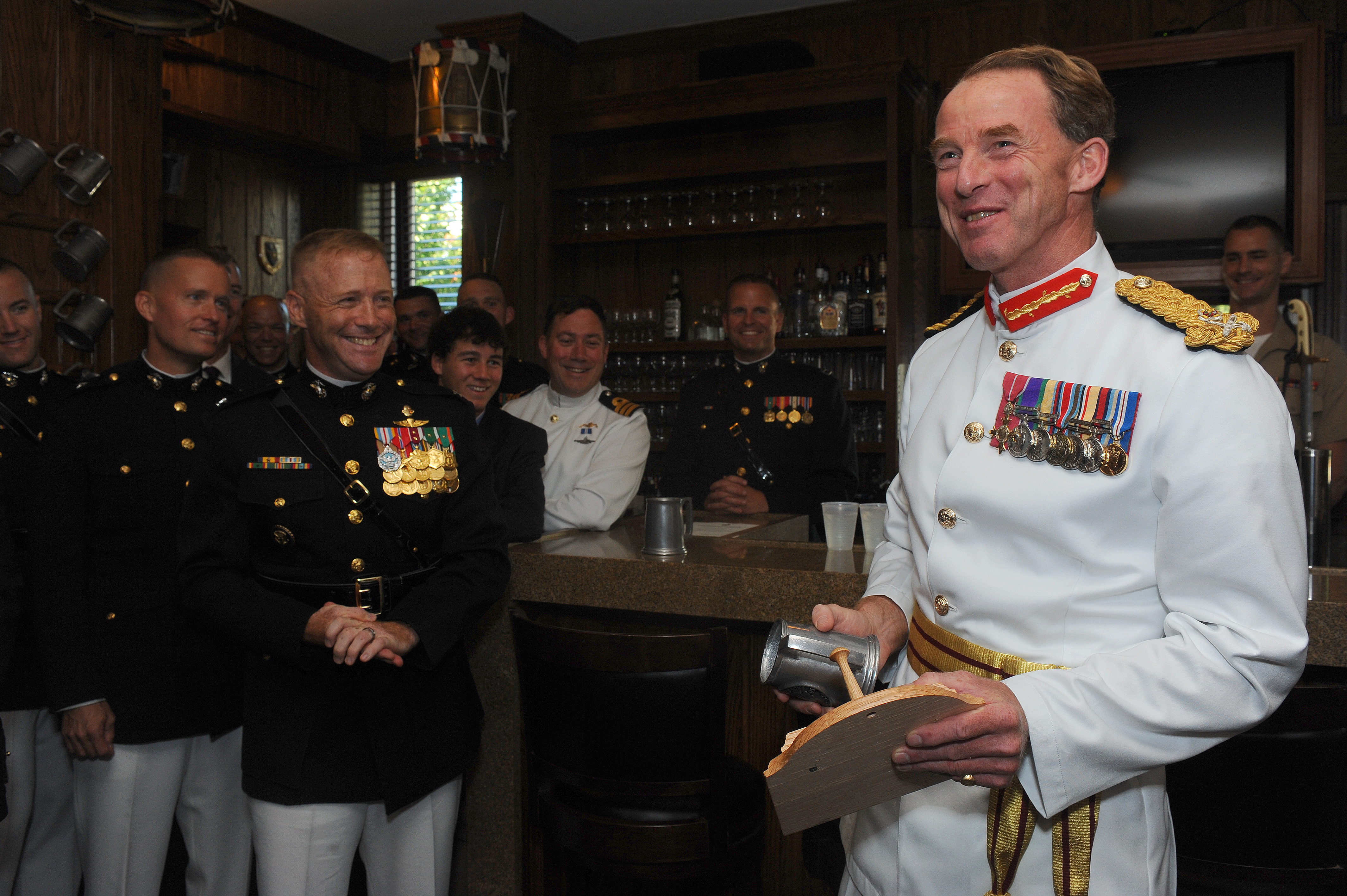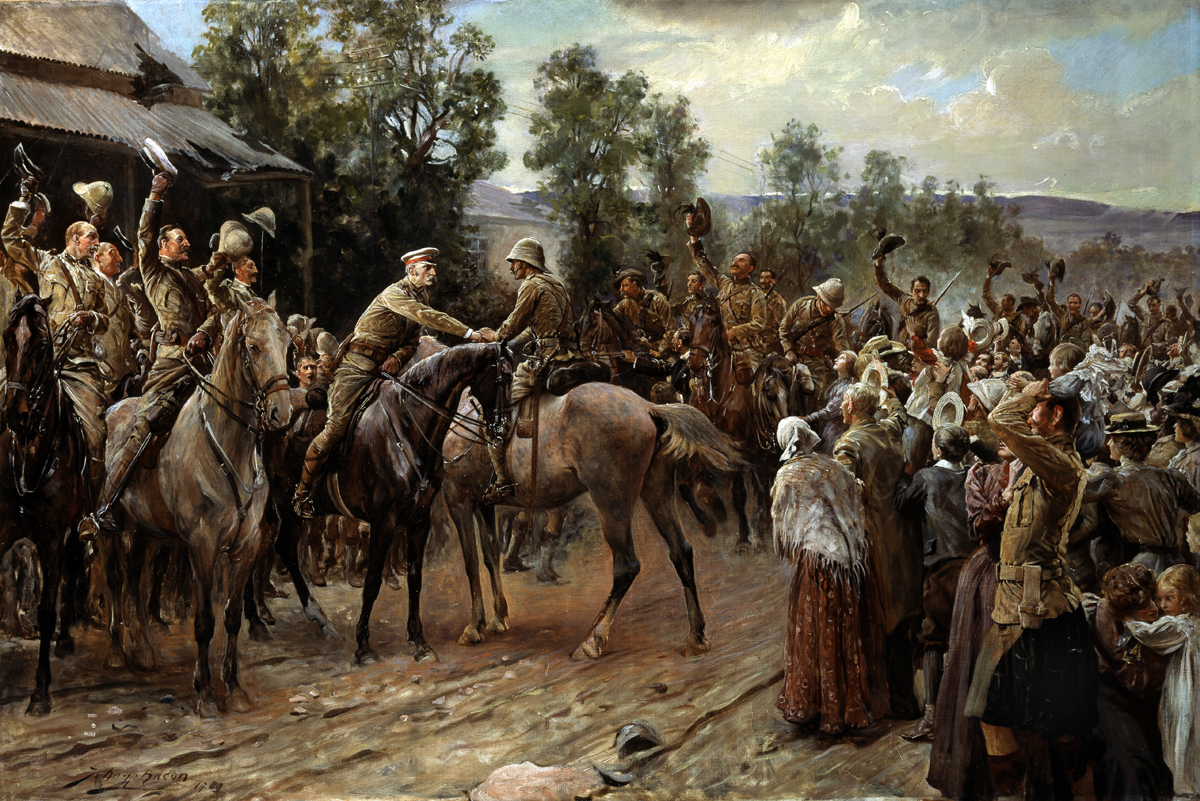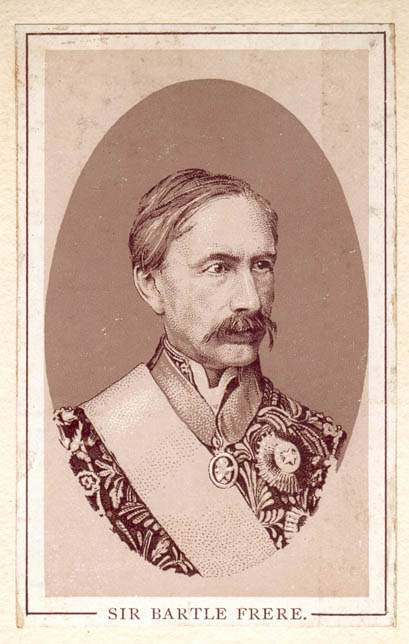|
Sir Charles Clarke, 3rd Baronet
General Sir Charles Mansfield Clarke, 3rd Baronet, (13 December 1839 – 22 April 1932) was a British Army officer who served as governor of Malta from 1903 to 1907. Military career Educated at Eton College, Clarke was commissioned into the 57th Regiment of Foot in 1856. He rose to become Commandant-General of the Colonial Forces of the Cape of Good Hope between 1880 and 1882. He held a series of administrative roles before becoming Commander-in-Chief of the Madras Army in 1893 (renamed "the Madras Command of the Indian Army" in 1895). He was appointed to the command of the Sixth Army Corps in the Second Boer War in South Africa in December 1899. He served as Quartermaster-General to the Forces from 1899 until 1903, during which he was promoted to general on 5 August 1902. The following year he became Governor and Commander-in-Chief of Malta, serving until he retired in 1907. He succeeded to the title of 3rd Baronet Clarke of Dunham Lodge on 25 April 1899. Family In ... [...More Info...] [...Related Items...] OR: [Wikipedia] [Google] [Baidu] |
General (United Kingdom)
General (or full general to distinguish it from the lower general officer ranks) is the highest rank achievable by serving officers of the British Army and the Royal Marines. The rank can also be held by Royal Marines officers in tri-service posts, for example, Generals Sir Gordon Messenger and Gwyn Jenkins, Sir Gwyn Jenkins, former Vice-Chief of the Defence Staff (United Kingdom), Vice-Chiefs of the Defence Staff. It ranks above Lieutenant-general (United Kingdom), lieutenant-general and, in the Army, is subordinate to the rank of Field marshal (United Kingdom), field marshal, which is now only awarded as an honorary rank. The rank of general has a NATO-code of Ranks and insignia of NATO, OF-9, and is a four-star rank. It is equivalent to a Admiral (Royal Navy), full admiral in the Royal Navy or an air chief marshal in the Royal Air Force. Officers holding the ranks of Lieutenant-general (United Kingdom), lieutenant-general and Major-general (United Kingdom), major-general m ... [...More Info...] [...Related Items...] OR: [Wikipedia] [Google] [Baidu] |
Commandant-General
Commandant-general is a military rank in several countries and is generally equivalent to that of major-general. Argentina Commandant general is the highest rank in the Argentine National Gendarmerie, and is held by the national director of the gendarmerie and his senior deputies. Depending on the appointment, it may be equal to any Argentine army rank from brigade general to the highest Argentine army rank, lieutenant general. Ireland During the Irish Civil War of 1922–23, the Irregulars, or anti-Treaty IRA, applied this term to the leaders of their various brigades throughout the country. The term was acquired from the Boer ranks, through veterans of the Irish Transvaal Brigade. Italy In Italy ''Comandante generale'' (commandant general) is the title of the general officers commanding the ''Carabinieri'', the '' Guardia di Finanza'' and the '' Corps of the Port Captaincies – Coast Guard''. It is an appointment, not a rank. In Fascist Italy's Blackshirts, ''comandante g ... [...More Info...] [...Related Items...] OR: [Wikipedia] [Google] [Baidu] |
George White (British Army Officer)
Field Marshal Sir George Stuart White, (6 July 1835 – 24 June 1912) was an officer of the British Army. He was stationed at Peshawar during the Indian Mutiny and then fought at the Battle of Charasiab in October 1879 and at the Battle of Kandahar in September 1880 during the Second Anglo-Afghan War. For his bravery during these two battles, he was awarded the Victoria Cross. He went on to command a brigade during the Third Anglo-Burmese War in 1886 and became commander of Quetta District in 1889 in which role he led operations in the Zhob Valley and in Balochistan. He was commander of the forces in Natal at the opening of the Second Boer War and fought at the Battle of Elandslaagte in October 1899. He commanded the garrison at the siege of Ladysmith: although instructed by General Sir Redvers Buller to surrender the garrison he responded "I hold Ladysmith for the Queen" and held out for another 75 days before being relieved in February 1900. He finished his career as Go ... [...More Info...] [...Related Items...] OR: [Wikipedia] [Google] [Baidu] |
George Wolseley
Lieutenant-General Sir George Benjamin Wolseley (11 July 1839 – 10 May 1921) was an Anglo-Irish officer in the Indian Army. Military career Wolseley was the third surviving son of Major Garnet Joseph Wolseley, of the 90th Regiment of Foot (Perthshire Volunteers), by his wife Frances Anne Smith (daughter of William Smith, County Dublin). He was the younger brother of Field Marshal Lord Wolseley and inventor Frederick Wolseley. Wolseley's paternal grandfather was Rev. William Wolseley, Rector of Tullycorbet, and the third son of Sir Richard Wolseley, 1st Baronet, who sat in the Irish House of Commons for Carlow. The family seat was Mount Wolseley in County Carlow. His father died in 1840, leaving a widow and seven children to survive on his Army pension. Money was short, leaving the Wolseley sons to be educated at the local school instead of being sent to England as was typical for boys of their class. He was commissioned into the 84th Regiment of Foot in 1857 and saw activ ... [...More Info...] [...Related Items...] OR: [Wikipedia] [Google] [Baidu] |
James Charlemagne Dormer
Lieutenant General The Honourable Sir James Charlemagne Dormer (26 January 1834 – 3 May 1893) was a British Army officer. Military career Dormer was the younger son of Joseph Thaddeus Dormer, 11th Baron Dormer. He became Chief of Staff of army of occupation in Egypt in 1882, Deputy Adjutant-General for auxiliary forces in 1885 and General Officer Commanding commanding Dublin District in 1886. He went to command the British Troops in Egypt in 1888 and become Commander-in-Chief of the Madras Army and a Member of the Council of the Governor of Fort St George in 1891. He died from injuries on 3rd May after being mauled by a tiger while on a hunt on 25 April 1893 in the Nilgiris. He was succeeded by General Mansfield Clarke as commander-in-chief of the Madras Army. His eldest son Roland succeeded his uncle as Baron Dormer Baron Dormer, of Wyng (or Wenge), County of Buckingham, is a title in the Peerage of England. It was created on 30 June 1615 for Sir Robert Dormer, 1st Ba ... [...More Info...] [...Related Items...] OR: [Wikipedia] [Google] [Baidu] |
Royal Victorian Order
The Royal Victorian Order () is a dynastic order of knighthood established in 1896 by Queen Victoria. It recognises distinguished personal service to the monarch, members of the royal family, or to any viceroy or senior representative of the monarch. The present monarch, King Charles III, is the sovereign of the order. The order's motto is ''Victoria.'' The order's official day is 20 June. The order's chapel is the Savoy Chapel in London. There is no limit on the number of individuals honoured at any grade. Admission is at the sole discretion of the monarch. Each of the order's five grades represent different levels of service, as does the medal, which has three levels of service. While all those honoured may use the prescribed styles of the order – the top two grades grant titles of knighthood, and all grades accord distinct post-nominal letters – the Royal Victorian Order's precedence amongst other honours differs from realm to realm and admission to some grades may be ba ... [...More Info...] [...Related Items...] OR: [Wikipedia] [Google] [Baidu] |
1896 Birthday Honours
The 1896 Birthday Honours were appointments by Queen Victoria to various orders and honours to reward and highlight good works by citizens of the British Empire. The appointments were made to celebrate the official birthday of The Queen, and were published in ''The London Gazette'' on 20 May and 26 May and in ''The Times'' on 20 May 1896. The recipients of honours are displayed here as they were styled before their new honour, and arranged by honour, with classes (Knight, Knight Grand Cross, ''etc.'') and then divisions (Military, Civil, ''etc.'') as appropriate. United Kingdom and British Empire Baron * Marquess of Granby (made Baron Roos of Belvoir) *The Rt Hon. Edward Heneage *Colonel John Wingfield Malcolm Privy Councillor The Queen appointed the following to Her Majesty's Most Honourable Privy Council: *Professor Max Muller Baronetcies * Robert Uniacke-Penrose-Fitzgerald * Charles Cave * William Ogilvy Dalgleish * Lewis McIver * Joseph Verdin Knight Bachelor *Jo ... [...More Info...] [...Related Items...] OR: [Wikipedia] [Google] [Baidu] |
Zulu War
The Anglo-Zulu War was fought in present-day South Africa from January to early July 1879 between forces of the British Empire and the Zulu Kingdom. Two famous battles of the war were the Zulu victory at Isandlwana and the British defence at Rorke's Drift. Following the passing of the British North America Act 1867 forming a federation in Canada, Lord Carnarvon thought that a similar political effort, coupled with military campaigns, might lead to a ruling white minority over a black majority in South Africa. This would yield a large pool of cheap labour for the British sugar plantations and mines, and was intended to bring the African Kingdoms, tribal areas, and Boer republics into South Africa. In 1874, Sir Bartle Frere was appointed as British High Commissioner for Southern Africa to effect such plans. Among the obstacles were the armed independent states of the South African Republic and the Zulu Kingdom. Frere, on his own initiative, sent a provocative ultimatum o ... [...More Info...] [...Related Items...] OR: [Wikipedia] [Google] [Baidu] |
Order Of The Bath
The Most Honourable Order of the Bath is a British order of chivalry founded by King George I of Great Britain, George I on 18 May 1725. Recipients of the Order are usually senior British Armed Forces, military officers or senior Civil Service (United Kingdom), civil servants, and the monarch awards it on the advice of His Majesty's Government. The name derives from an elaborate medieval ceremony for preparing a candidate to receive his knighthood, of which ritual bathing (as a symbol of Ritual purification, purification) was an element. While not all knights went through such an elaborate ceremony, knights so created were known as "knights of the Bath". George I constituted the Knights of the Bath as a regular Order (honour), military order. He did not revive the order, which did not previously exist, in the sense of a body of knights governed by a set of statutes and whose numbers were replenished when vacancies occurred. The Order consists of the Sovereign of the United King ... [...More Info...] [...Related Items...] OR: [Wikipedia] [Google] [Baidu] |
Orme Bigland Clarke
Orme Bigland Clarke, 4th Baronet (8 October 1880 in Calcutta, India – 31 March 1949) was a British lawyer and military officer. Biography He was the son of Frederick Clarke, second son of Sir Charles Clarke, 2nd Baronet, and Adelaide Catherine Kerrison. He was educated at Eton College, Berkshire and Magdalen College, Oxford University. He was called to the bar at the Inner Temple, in 1906. As a lawyer, he worked under Sir John Simon for 8 years after being called to the bar. Military and legal career He was invested as a Commander of the Order of the British Empire ( CBE). He succeeded to the title of 4th Baronet Clarke, of Dunham Lodge, Norfolk, on 22 April 1932 from his uncle General Sir Charles Mansfield Clarke, 3rd Baronet GCB GCVO (13 December 1839 – 22 April 1932). Sir Orme is credited with helping implement the foundation of the Palestinian Legal system. According to Dan Izenberg in his article: "Founding Father"(see Sources), author Natan Brun writes in his "J ... [...More Info...] [...Related Items...] OR: [Wikipedia] [Google] [Baidu] |
Clarke Baronets
There have been five baronetcies created for persons with the surname Clarke, two in the Baronetage of England and three in the Baronetage of the United Kingdom. Two of the creations are extant as of 2010. * Clarke baronets of Salford Shirland (1617) * Clarke baronets of Snailwell (1698) * Clarke, later Clarke-Travers baronets, of Crosses Green (1804): see Clarke-Travers baronets * Clarke baronets of Dunham Lodge (1831) * Clarke baronets of Rupertswood (1882) See also * Clark baronets *Clerk baronets * Clerke baronets *Clerk family The Clerk family () is a Ghanaian historic family that produced a number of pioneering scholars and clergy on the Gold Coast. Predominantly based in the Ghanaian capital, Accra, the Clerks were traditionally Protestant Christian and affiliated ... * Clarke-Jervoise baronets {{DEFAULTSORT:Clarke Set index articles on titles of nobility ... [...More Info...] [...Related Items...] OR: [Wikipedia] [Google] [Baidu] |
General (British Army)
General (or full general to distinguish it from the lower general officer ranks) is the highest rank achievable by serving officers of the British Army and the Royal Marines. The rank can also be held by Royal Marines officers in tri-service posts, for example, Generals Sir Gordon Messenger and Gwyn Jenkins, Sir Gwyn Jenkins, former Vice-Chief of the Defence Staff (United Kingdom), Vice-Chiefs of the Defence Staff. It ranks above Lieutenant-general (United Kingdom), lieutenant-general and, in the Army, is subordinate to the rank of Field marshal (United Kingdom), field marshal, which is now only awarded as an honorary rank. The rank of general has a NATO-code of Ranks and insignia of NATO, OF-9, and is a four-star rank. It is equivalent to a Admiral (Royal Navy), full admiral in the Royal Navy or an air chief marshal in the Royal Air Force. Officers holding the ranks of Lieutenant-general (United Kingdom), lieutenant-general and Major-general (United Kingdom), major-general m ... [...More Info...] [...Related Items...] OR: [Wikipedia] [Google] [Baidu] |





